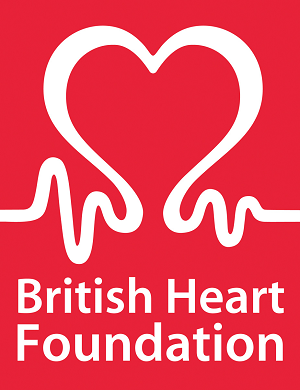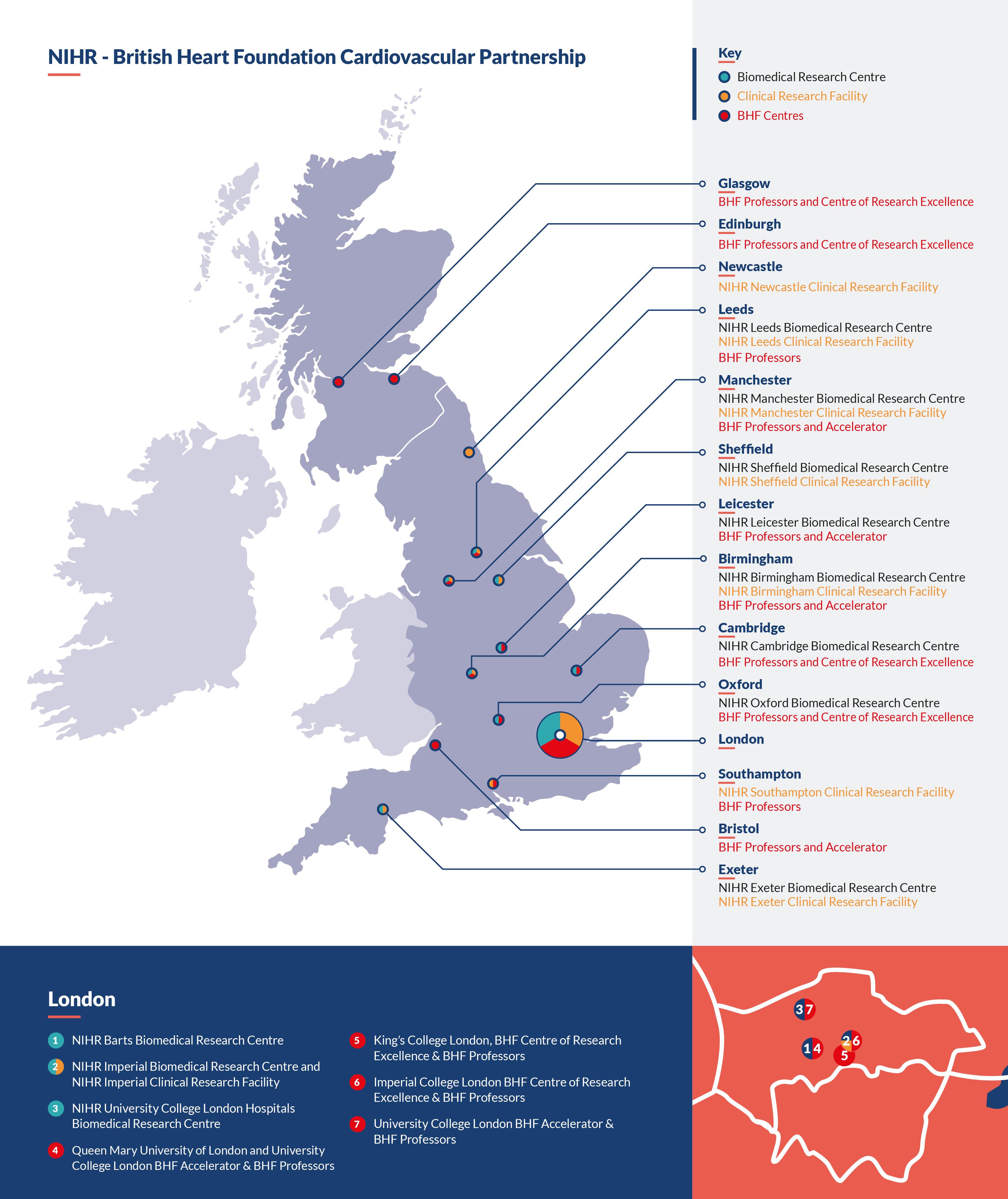NIHR-British Heart Foundation Cardiovascular Partnership


Summary
The NIHR-BHF Cardiovascular Partnership provides a platform for collaboration between researchers funded by NIHR and the British Heart Foundation (BHF). A recent collaboration with the Chief Scientist Office (CSO) has enabled formal representation of four Scottish cardiovascular centres within the Partnership.
The ultimate goal of this academic-led initiative is to catalyse progress in cardiovascular research and translate scientific discoveries into benefits for people affected by heart and circulatory diseases.
 The Partnership connects world-leading research expertise and infrastructure funded by NIHR and BHF, located in the major universities and NHS Trusts across the UK. The Partnership aims to:
The Partnership connects world-leading research expertise and infrastructure funded by NIHR and BHF, located in the major universities and NHS Trusts across the UK. The Partnership aims to:
- Identify research priorities that meet patients’ needs
- Provide a collaborative framework for NIHR and BHF cardiovascular translational researchers to deliver world-leading cardiovascular research, leverage funding, and maximise the impact of projects
- Create opportunities for alignment between NIHR and BHF, and to promote collaborations with industry and other stakeholders.
Work with us
If you have ideas for research collaborations, The Partnership can help you to work with theme-focused cardiovascular experts from across the UK to develop and deliver research quickly and accelerate translation to the clinic. We have the knowledge and experience needed to get large-scale collaborations off the ground and to support the development of ideas from an early stage through to a mature project suitable for a funding application.
“The NIHR-BHF Cardiovascular Partnership has given us the ideal platform to harmonise the diagnosis and management of coronary microvascular disease across the UK.
Under the aegis of the partnership, we have already formed a collaborative network with more than 20 centres across the country, which also provides an excellent basis for performing patient-centred research in the coming years.”Professor Divaka Perera, King’s College London
We are keen to explore collaborations with experts based within and outside the UK, as well as academic researchers, the life science industry, charities, patient groups and other stakeholders. Our cardiovascular researchers from NIHR and BHF funded centres are also interested in joining efforts with colleagues from other disciplines.
“The NIHR-BHF Cardiovascular Partnership has been integral in the development of the UK HFpEF Registry. Recognising the international priority of the Registry, the Partnership adopted it as a collaborative workstream and helped to assemble the multidisciplinary UK network of investigators, co-ordinating the UK’s international expertise and capabilities in this area”.
Professor Christopher Miller, University of Manchester.
The NIHR-BHF Cardiovascular Partnership offers the following benefits to its collaborators:
- Flexibility: The possibility to address several focus areas simultaneously, across a spectrum of priorities.
- Agility: We can quickly mobilise the community in response to arising priorities and urgent requests.
- Inclusivity: All researchers are welcome to bring their ideas into the Partnership.
- Traction: Support for the necessary groundwork needed to transform ideas into research plans.
- High impact: The collaborative programmes developed by the Partnership allow our community of experts to tackle research questions that require scale.
Our UK-wide collaborative research workstreams bring:
- Faster translation of scientific discoveries into benefits for patients
- Increased capacity to support early phase clinical research delivery
- Increased scope and capacity for high-quality research in an identified area of focus or unmet need
- Increased operational efficiency for delivery of collaborative, experimental medicine research
- Multi-centre research enabled through agreed processes and ways of working
- Improved interactions with external stakeholders such as industry, patient groups and charities
- Opportunities to create strategic alignment between the NIHR, BHF, and other key partners for further cardiovascular research.
For further information about the Cardiovascular Partnership and to find out how to work with us, please contact us.
Our expertise and capabilities
The NIHR-BHF Cardiovascular Partnership is currently developing UK-wide collaborative research programmes in several thematic areas of cardiovascular research and medicine.
Cardiovascular Partnership Themes and Leads
Our themes and collaborative programmes focus on:
- Cardio-Immunology
- CARDIOvascular-Immune-Medicated Inflammatory Disease (CARDIO-IMID) - Professor Maya Buch
- Inflammatory Cardiomyopathies - Professor Sanjay Prasad and Professor Federica Marelli-Berg
- Recurrent Pericarditis - Professor Helen Lachmann and Dr Claire Peet
-
Heart Failure with preserved Ejection Fraction (HFpEF) - Professor Chris Miller
-
Coronary Microvascular Dysfunction (CMD) - Professor Divaka Perera and Professor Amedeo Chiribiri
-
Aortic Stenosis and Valve Disease - Professor Marc Dweck
-
Maternal Cardiovascular Health - Professor Deborah Lawlor
-
Pulmonary Hypertension (as a common comorbidity of cardiovascular disease) - Professor Allan Lawrie
-
MINOCA and Myocardial Injury - Professor Colin Berry
-
Cardio-Oncology - Professor Ninian Lang
Covid - 19 Research Framework
Working closely with the British Heart Foundation and the BHF Clinical Research Collaborative, we set up a Covid-19 Research Framework to identify and prioritise research projects tackling key questions on Covid-19 and cardiovascular health. Through this framework we have identified seven Covid-19 Cardiovascular Disease Flagship Projects.
Our experts lead the Cardiovascular Working Group within the PHOSP Consortium to help maintain alignment and avoid duplication of efforts between studies focused on Covid-19 and cardiovascular disease. The working group also develops new projects based on emerging evidence from the PHOSP Consortium, the Covid-19 Cardiovascular Disease Flagship Projects and other studies.
Who we are
The NIHR-BHF Cardiovascular Partnership brings together NIHR infrastructure with BHF investment through its Professors and Centres.
The Partnership is led by Chair Professor Keith Channon who is the BHF Field Marshal Earl Alexander Chair of Cardiovascular Medicine at the University of Oxford and Deputy Chair Professor Chris Miller from the University of Manchester. Dr Simon Fisher is the Partnership Manager.
A map showing the breadth of expertise in cardiovascular health in the UK
The map below shows the NIHR and BHF centres based across the UK which are part of this Partnership (listed below).

NIHR Biomedical Research Centres (BRCs), Clinical Research Facilities (CRFs) and Academic Leads
- Barts Biomedical Research Centre
Professor Panagiotis Deloukas, and Professor Federica Marelli-Berg - Birmingham Biomedical Research Centre
Professor Rick Steeds and Professor Jonathan Townend - Cambridge Biomedical Research Centre
Professor Ian Wilkinson - Exeter Biomedical Research Centre
Professor Angela Shore - Imperial Biomedical Research Centre
Dr Rasha Al-Lamee - Leicester Biomedical Research Centre
Professor Gerry McCann - Leeds Biomedical Research Centre
Professor David Beech - Manchester Biomedical Research Centre
Professor Bernard Keavney and Professor Maciej Tomaszewski - Oxford Biomedical Research Centre
Professor Barbara Casadei and Professor Keith Channon - Sheffield Biomedical Research Centre
Professor Tim Chico and Professor Robert Storey - University College London Hospitals Biomedical Research Centre
Professor Aroon Hingorani
NIHR Clinical Research Facilities and Academic Leads
- Exeter Clinical Research Facility
Professor Angela Shore - Imperial Clinical Research Facility
Professor Martin Wilkins - Leeds Clinical Research Facility
Professor Mark Kearney - Manchester Clinical Research Facility
Professor Chris Miller - Newcastle Clinical Research Facility
Professor AzfarZaman - Sheffield Clinical Research Facility
Professor Chris Newman - Southampton Clinical Research Facility
Professor Nick Curzen
British Heart Foundation (BHF) Centres
- Cambridge, Edinburgh, Glasgow and Oxford
BHF Professors and Centre of Research Excellence - Leeds and Southampton
BHF Professors - Birmingham, Bristol, Leicester and Manchester
BHF Professors and Accelerator - London
BHF Professors, Queen Mary University of London and University College London BHF Accelerators, King's College London and Imperial College London BHF Centres of Research Excellence.
Scottish Cardiovascular Centres (CSO Collaboration)
- University of Glasgow
- University of Edinburgh
- University of Aberdeen
- University of Dundee
Latest news about cardiovascular health research
3
custom_in_specialty
10433
images



